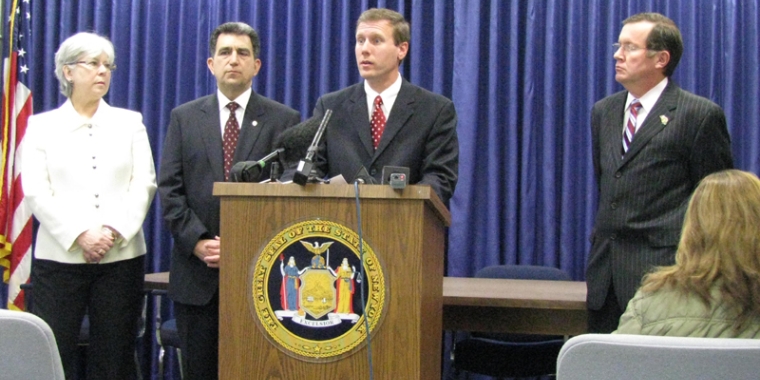
Officials talk about new laws strengthening sentences for drunk drivers and class A-I offenders
David J. Valesky
November 20, 2009
-
ISSUE:
- Crime

Two recently passed laws strengthen the penalty drunk drivers and class A-1 offenders can receive as a sentence.
Assemblyman William B. Magnarelli (D-Syracuse, Geddes and Van Buren) and State Senator David J. Velasky (D-Oneida) praised these two bills they sponsored as being important legislation aimed at preventing more tragedies.
Imposing Consecutive Sentences When Convicted of a Class A-1 Felony
The A-1 Felony bill, authored by Assemblyman William B. Magnarelli (D-Syracuse, Geddes and Van Buren), and sponsored in the Senate by Senator David Velasky (D-Oneida), imposes consecutive sentences for persons convicted of Class A-1 felony offences. It also prevents ill inmates from using previous time served as credit toward the minimum 50 percent service requirement when seeking medical parole.
“This legislation ensures that violent felons receive the sentences proportional to the gravity of their crimes,” said Assemblyman Magnarelli. “It is a measure aimed at reducing recidivism and keeping violent felons off our streets.”
Governor David Paterson signed the bill Monday after the legislature passed it in an extraordinary session last week. It closes a loophole in Jenna’s law, a bill passed in 1998, mandating tougher sentences for violent felons.
Jenna’s Law, named in honor of Jenna Grieshaber who was killed in 1997 by a paroled felon, ended indeterminate sentencing for first-time violent felony offenders and provides eligibility for release only after serving 85 percent a prison term. Jenna's Law also established mandated post-release supervision terms for all violent felony offenders upon their release from prison.
“Closing this loophole will keep violent criminals off the street and hopefully prevent future tragedies that can result when these criminals get out before serving an appropriate prison sentence,” said Sen. David J. Valesky, who sponsored the bill in the senate. “I am pleased to have worked with the Governor, Assemblyman Magnarelli and local District Attorneys to pass this important legislation.”
The new law helps prevent future serious crimes by making sure those who commit A-1 felonies are kept safely behind bars and are not prematurely released to the streets.
A-I felonies include aggravated murder, first or second degree murder and first degree kidnapping, arson, and criminal possession or use of a chemical or biological weapon, as well as those convicted of first degree manslaughter. Additionally, those convicted of a second child sexual assault would be required to receive a consecutive sentence.
“This legislation addresses a quirk in the law that provides windfalls to those who commit murder or other A-1 felonies while on parole,” said Onondaga County District Attorney William Fitzpatrick. “The current law is nonsensical and can result in convicted murderers being eligible for parole almost immediately upon being sentenced. In essence, right now, a parolee whose victim dies has better sentencing prospects than a parolee whose victim survives. This bill corrects this anomaly.”
It is an anomaly that could save someone’s life. Onondaga County District Attorney William Fitzpatrick and Janice Grieshaber Geddes, founder of Jenna’s Foundation for Nonviolence, brought their concerns to the local legislators after finding the loophole.
"I am pleased that this bill not only passed, but passed quickly, saving lives and illustrating that when we work together we can do whatever is necessary to keep our communities safe,” said Janice Grieshaber Geddes. “The loophole, once recognized, was clearly unintended and the action taken to close it was necessary to insure that those committing violent crimes were held fully accountable and that judges, victims and others are able to sleep at night knowing that the sentence passed would be the sentence served."
Leandra’s Law: Increasing the penalty for DWI with a child passenger
The other bill, referred to as Leandra’s Law, drastically increases the penalty for any person who drives intoxicated with a child passenger. The legislation makes all DWI with child passenger violations fall in the felonies classification.
“Driving while intoxicated with a child in the vehicle is unconscionable. I am pleased that this important legislation provides tougher penalties which will hopefully prevent more tragedies from happening,” Senator Valesky, Vice President Pro Tempore of the Senate said.
Two recent fatal incidents involving intoxicated drivers with child passengers have highlighted the need for stronger measures to prevent or punish offenders. The legislation is named for one of those victims, Leandra Rosado, who died at age 11 in a car accident where the other driver involved was intoxicated.
“Tragedies such as these are preventable,” said Assemblyman Magnarelli. “The legislation reinforces the severity with which we view people who drive while intoxicated, especially with a child in the vehicle.”
The legislation also mandates ignition devices for all DWI convictions. All offenders will be required to install an ignition interlock device in their vehicle upon conviction of any DWI offenses, which may only be waived upon a judicial finding that the offender has no history of alcohol abuse or dependence.
Share this Article or Press Release
Newsroom
Go to NewsroomSenate Passes Valesky Bill to Combat Meth Production
June 21, 2012
Senate Passes Valesky Bill to Combat Meth Production
June 21, 2012